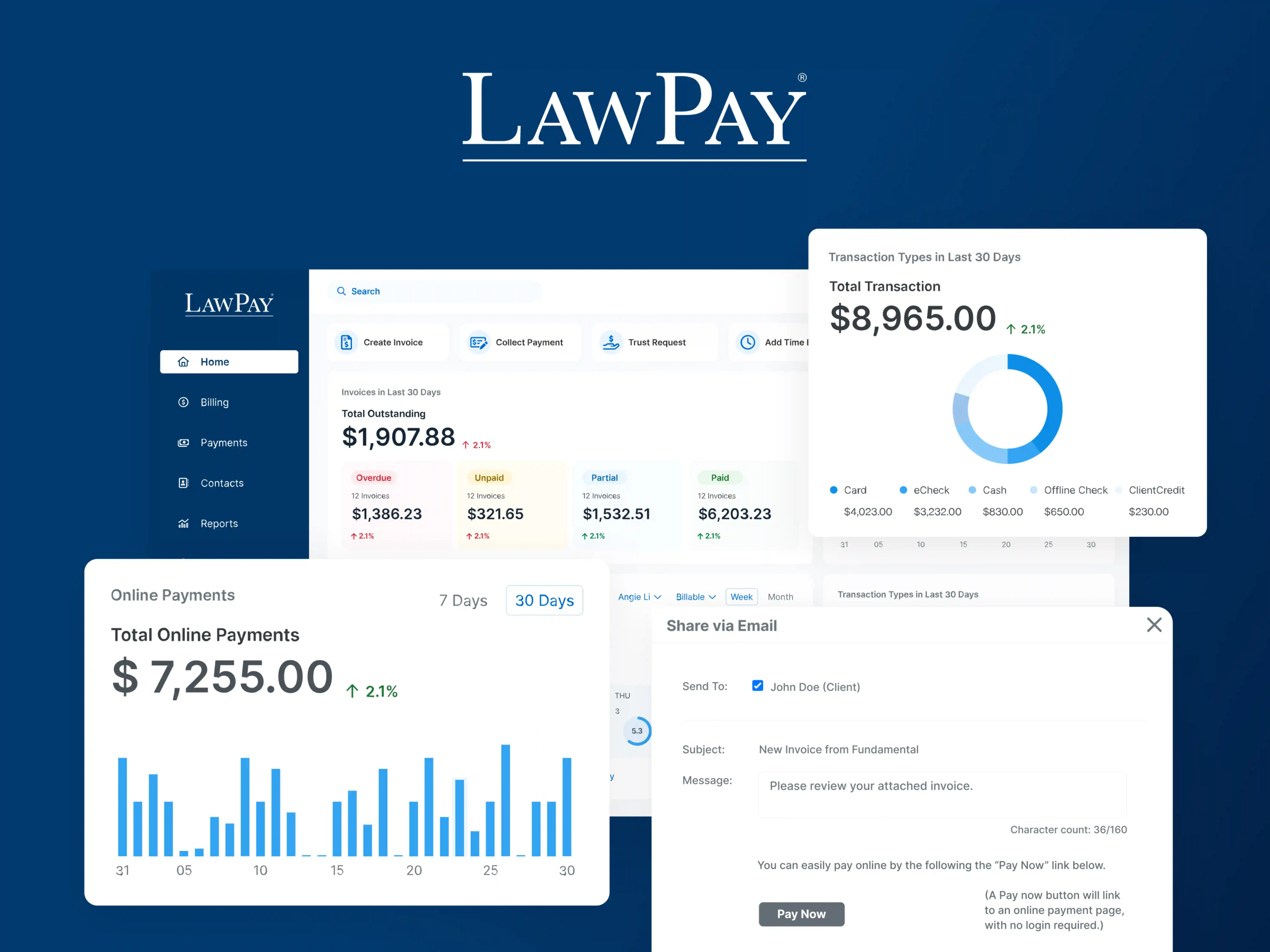Running a law firm can come with more costs than you originally anticipated. Business expenses like payroll, office equipment, and legal practice management software can quickly add up.
Taking advantage of lawyer tax deductions can help you manage your law firm’s expenses and cut costs by lowering your law firm’s tax payments. Although it may be tempting to speed through filings, you might leave money on the table in the rush to finish.
This guide will cover a few common attorney tax deductions that could help save your firm money.
Our guide is for educational purposes only and is not an exhaustive list. Tax deduction eligibility is also dependent on your law firm’s business structure We recommend consulting an accounting or tax professional for advice on filing tax deductions and requirements for specific tax years.
1. Advertising Expense Deductions
Law firms need to spend money on advertising and marketing like any other business.
Advertising is also a common lawyer tax deduction you can leverage to offset spending. Potential deductible expenses may include costs for printing flyers or types of law firm digital marketing, like running paid advertisements on Google and Facebook. However, we strongly recommend working with an accounting or tax professional to help you understand what expenses qualify as advertising.
2. Retirement and Pension Plan Deductions
Businesses often support their employees' retirement accounts and pension plans to incentivize and reward top talent. Retirement plan contributions are another source of law firm tax deductions. A few popular plans include Savings Incentive Match Plan for Employees (SIMPLE) IRAs, 401(k) plans, and pension plans.
SIMPLE IRAs let employers make contributions of 2% or 3% of employee compensation. They’re available for small businesses with 100 or less employees. Deductions depend on your business structure.
401(k)s are more adaptable by allowing you to choose the percentage you want to match. As of the time of writing, deductions can’t exceed 25% of compensation accrued or paid to eligible participating employees during the year.
Simplified Employee Pension Plans (SEP) are available to all businesses regardless of size. Only employers contribute to this plan. Employers' contributions are tax-deductible, and employees can omit them from their gross income.
3. Mileage, Vehicle, and Local Travel Deductions
Most of the action in popular legal dramas occurs in the courtroom, but real-life lawyering requires a fair bit of travel. This includes driving to meet a client, commuting to interview a witness, examining evidence, or taking a deposition.
You can deduct local commuting expenses based on mileage or itemize associated costs accumulated during these activities to reduce your law firm’s tax burden.
The standard mileage deduction is based only on miles driven for typical business commutes. The mileage rate for 2024 is 67 cents for every mile.
Deducting based on actual expenses requires you to meticulously track spending and documentation for expenses like gas, tire rotations, and insurance.
Overall, tax planning for lawyers requires an organized law firm accounting system and meticulous financial record-keeping regardless of which filing options you choose. In case of an IRS audit, you must have receipts for your mileage and related costs.
4. Travel Deductions
In addition to deductions for your daily commutes, many other long-distance travel-related expenses are also eligible for tax deductions.
These include long-distance transportation costs, such as:
Airplane, train, or bus tickets
Fares or fees for taxis, rideshare services, or buses
Car rental fees
Tolls and parking
You can also deduct certain expenses accrued while traveling, like:
Meals
Luggage and shipping
Lodging
Laundry services
Familiarize yourself with the IRS distinctions between deductions related to local transportation and more long-term travel.
To qualify for travel-related deduction, the IRS requires you to commute away from your tax home or place of business. You’re considered away from your tax home if you’re away longer than a normal day’s work and need rest to continue working.
5. Educational Expense Deductions
Successfully practicing law requires a sharp mind. A typical day can range from digging through the archives for an obscure case to trading verbal blows in court. To accomplish this, you must stay up-to-date on new legal developments and fulfill continuing education requirements to maintain your license.
You can potentially deduct educational expenses that you and your staff partake in. For example, you may cover a certain number of Continuing Legal Education (CLE) classes for employees as part of their benefits package.
If you’d still like to save money on training, LawPay offers a variety of free high-quality CLEs.
Watch our CLE webinar on Current Trends in Attorneys Fees to learn more about modern trends in legal billing and finances like subscription models, flexible payments, and more.
6. Business Supplies and Services
The cost of supplies like computers, software, and notepads can make up a large portion of deductions for any law firm’s taxes. Spending for outsourced services like HR and accounting are also potentially eligible.
However, managing paper receipts and invoices throughout the year can quickly become an administrative nightmare. Converting to a fully paperless law office can eliminate physical file cabinets and help keep documentation organized come tax season.
7. Home Office Expenses
You may be able to deduct tax expenses for the business use of your home if you have a dedicated area for practicing law. You can fully deduct direct business expenses, like maintenance and repairs to your office. You can also partially deduct indirect expenses like utilities.
There are two ways to deduct home office expenses:
The regular method allows you to fully deduct direct business expenses and partially deduct indirect expenses.
The simplified option allows you to calculate deductions based on the area of your home used for business. At the time of writing, this is calculated at a rate of $5 per square foot with a maximum of 300 square feet.
Maintaining an accurate chart of accounts for your law firm is especially important when working from home. Accurate records can help keep business and personal expenses separate.
8. Interest On Student Loans
Student loans are not tax-deductible, but you can potentially claim interest on student loans depending on how your business is structured. We recommend consulting a tax professional to determine if your business can use this deduction.
For loans to generally qualify for tax deductions, you must have taken out the student loan for you, your dependents, or your spouse. The loan doesn’t qualify if you are claimed by someone else as a dependent. These deductions are applicable for all student loans, including non-federal ones.
9. Credit Card Fees
Law firms are increasingly using digital payments, like credit cards. Our 2024 Legal Industry Trends Report found that 78% of law firms accept online payments with credit and debit cards. Of those who accepted credit cards, 54% experienced an average monthly collection rate increase of at least $1,000.
Accepting this payment method at your law firm can make it easier for clients to pay. However, credit card companies charge processing fees for handling transactions.
Some businesses pass along transaction fees to customers, but these fees are potentially considered tax deductible if your firm pays them.
Track Your Business Expenses To Manage Your Taxes Properly
Maximizing lawyer-specific tax deductions is much easier when you can see spending at a high level. LawPay’s legal spend management features help you track spending across your firm to see real-time insights, manage reimbursable expenses, and store receipts.
Join LawPay’s Smart Spend waitlist to give your team the tools to manage firm and client expenses once the feature is released.
Schedule a demo to see what LawPay can offer your firm.
Book Now
Keeping a clear paper trail is valuable for lawyer tax planning and even more valuable for managing your law firm’s expenses year-round.
Schedule a demo to see how LawPay can simplify the financial side of running a legal practice.
About the author

Trent Fowler
